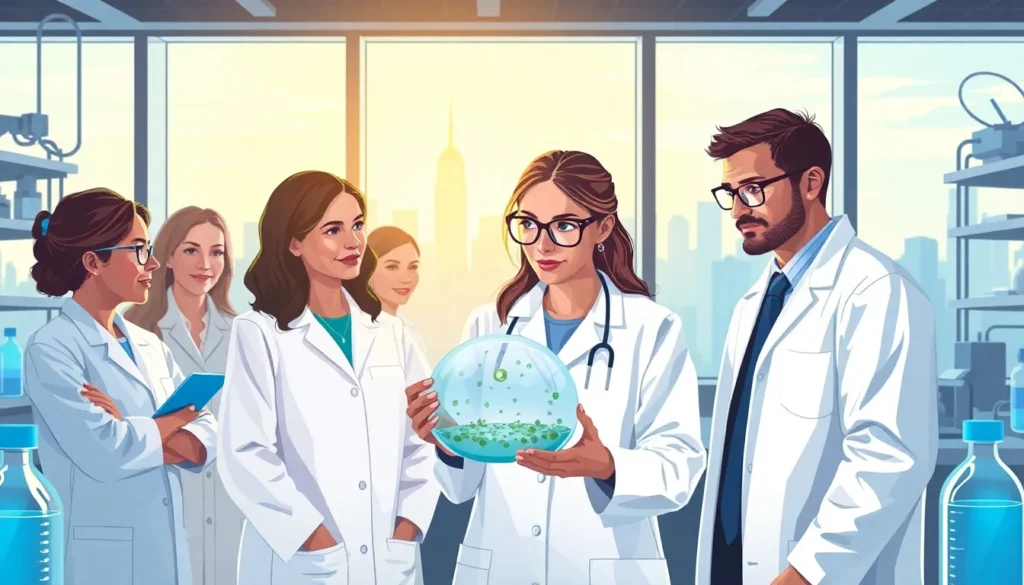Throughout history, a handful of scientific discoveries have turned the world on its head, often with results that are nothing short of miraculous. From the discovery of penicillin to the theory of relativity, these breakthroughs not only reshaped our understanding of the universe but also revolutionized everyday life. Imagine a world without vaccines or the internet—scary, right?
Scientific Discoveries That Changed the World
Scientific discoveries have significantly influenced human progress. Breakthroughs in fields such as medicine, physics, and technology shaped modern society. Penicillin, discovered by Alexander Fleming in 1928, transformed healthcare by introducing antibiotics that save millions of lives. The theory of relativity, developed by Albert Einstein in the early 20th century, revolutionized our understanding of space and time.
Vaccines have played a critical role in public health, eradicating diseases such as smallpox. The development of the internet changed communication, access to information, and global connectivity. Each innovation has opened new avenues for exploration and understanding, fostering advancements in various scientific fields.
Energy sources, including electricity and nuclear power, have profoundly altered human civilization. Discoveries in genetics, such as the structure of DNA uncovered by James Watson and Francis Crick, laid the foundation for modern biotechnology. These advances lead to developments in agriculture, medicine, and forensic science.
Astronomy has unveiled the mysteries of the universe, thanks to discoveries like the heliocentric model proposed by Nicolaus Copernicus. This model shifted the Earth’s position in the cosmos and influenced scientific thought for centuries. The advancement of satellites and telescopes has provided invaluable data, pushing the boundaries of human knowledge.
Scientific discoveries serve as cornerstones of innovation, improving quality of life and addressing complex global challenges. Each discovery builds upon the last, creating a web of knowledge that continues to expand. Collaborations across disciplines foster new insights, ensuring that scientific progress remains a driving force in society.
Life-Changing Medical Breakthroughs

Medical breakthroughs have transformed healthcare dramatically. Discoveries in vaccines and antibiotics have significantly enhanced life expectancy and overall health.
Vaccines and Immunizations
Vaccines prevent countless infectious diseases. Their introduction has led to the eradication of smallpox and a dramatic decline in polio cases. Vaccination strategies protect communities by ensuring herd immunity. For instance, the measles vaccine has reduced global cases by over 80% since its implementation. Immunizations save millions of lives annually, with the World Health Organization reporting 2-3 million lives saved through routine vaccinations. Access to vaccines continues to be crucial for public health, especially amid emerging viral threats.
Antibiotics and Antivirals
Antibiotics revolutionized treatment for bacterial infections. Penicillin, discovered by Alexander Fleming in 1928, became the first widely used antibiotic, saving countless lives. Antivirals, like Oseltamivir for influenza, provide effective treatments for viral infections. The development of these medications has reduced mortality rates associated with previously deadly diseases. According to the Centers for Disease Control and Prevention, antibiotics prevent more than 2 million infections each year. Ongoing research focuses on combating antibiotic resistance, ensuring the effectiveness of these life-saving medicines in the future.
Groundbreaking Theories in Physics
Groundbreaking theories in physics have reshaped humanity’s understanding of the universe. Two theories stand out: the theory of relativity and quantum mechanics.
Theory of Relativity
Einstein’s theory of relativity revolutionized the perception of time and space. This theory comprises two parts: special relativity and general relativity. Special relativity demonstrates that the laws of physics remain constant for all observers, regardless of their relative speed. General relativity expands on this concept, asserting that gravity is the curvature of spacetime caused by mass. The impact of these insights changed the field of cosmology. GPS technology also relies on adjustments made for relativistic effects. It provides accurate location data by factoring time dilation caused by speeds close to light and gravitational fields.
Quantum Mechanics
Quantum mechanics introduced a new framework for understanding atomic and subatomic phenomena. This theory suggests that particles exist in states of probability rather than certainty. Heisenberg’s uncertainty principle highlights limitations in measuring particle properties simultaneously. Such principles enable advancements in technology, including semiconductors and lasers. Additionally, quantum mechanics lays the foundation for quantum computing, promising to revolutionize data processing. Highlights of ongoing experiments focus on quantum entanglement, which could transform secure communication methods. The influence of these concepts extends far beyond traditional physics, affecting various fields and everyday technologies.
Revolutionizing Technology
Technological advancements stem from groundbreaking scientific discoveries. Innovations have fundamentally altered communication and energy sectors.
The Invention of the Internet
The internet reshaped global communication. It provides instant access to information, connecting billions of users worldwide. Businesses leverage online platforms for commerce, reaching customers across continents. Social media platforms foster interaction, forming communities around shared interests. According to the International Telecommunication Union, over 5 billion people accessed the internet in 2022. Enhanced connectivity leads to cultural exchange and innovation. The rise of cloud computing and data sharing has transformed industries, creating new markets. Online education and remote work gained popularity due to this technological revolution.
Advancements in Renewable Energy
Renewable energy technologies have emerged as vital solutions for sustainable living. Solar, wind, and hydropower sources significantly reduce greenhouse gas emissions. The International Renewable Energy Agency reported global renewable energy capacity reached 3,021 gigawatts in 2020. Solar energy installations have surged, making solar power one of the fastest-growing sources. Wind energy advancements, particularly in turbine efficiency, enable greater energy harvest. Transitioning to renewable resources helps combat climate change, ensuring a healthier planet. Increased investments in these technologies promote job creation and economic growth. With continued innovation, these energy sources contribute to long-term sustainability.
Transformative Discoveries in Biology
Biological discoveries have significantly reshaped human understanding and existence. They encompass groundbreaking insights into genetics and evolution.
DNA Structure and Genetics
Watson and Crick’s discovery of DNA’s double helix structure in 1953 framed modern genetics. This revelation unveiled how genetic information transmits from one generation to another. Genes, which serve as units of heredity, inform traits and biological functions. Research on genes has led to breakthroughs in genetic engineering and biotechnology. For example, CRISPR technology allows precise editing of genetic sequences, promoting advancements in medical treatments and agriculture. The Human Genome Project further mapped the entire human genome, providing crucial insights into genetic predispositions to diseases. Such advancements transform medical practices and enhance personalized healthcare approaches.
Evolutionary Theory
Charles Darwin’s theory of evolution by natural selection revolutionized how species’ development is understood. The concept asserts that organisms adapt over time in response to environmental changes. Evidence supporting evolution spans various fields, including paleontology and genetics, underscoring species’ connections. Evolutionary biology emphasizes the importance of biodiversity and conservation efforts today. Understanding evolution informs public health strategies as well. For instance, tracking changes in pathogens helps tackle antibiotic resistance and emerging diseases. Such foundations in evolutionary theory continue to influence scientific research and inform conservation policies globally.
Conclusion
Scientific discoveries have profoundly shaped the world in countless ways. From medical breakthroughs that save millions of lives to theories that redefine our understanding of the universe, these advancements have laid the groundwork for modern society. The impact of innovations like vaccines and the internet continues to resonate, driving progress and enhancing everyday life.
As research evolves, the potential for future discoveries remains limitless. Each breakthrough not only addresses current challenges but also opens new avenues for exploration and understanding. Embracing this spirit of inquiry will ensure that humanity continues to thrive in an ever-changing landscape.

